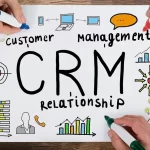Did you know as per the report of Statista the global CRM software market is expected to reach $89.03 billion in revenue in 2024?
The astonishing numbers mentioned above clearly show the rise in the demand for CRM for businesses.CRMs are efficient tools taken into consideration by firms to expedite business growth, enhance cross-team collaboration, manage contact records, sync data, automate tasks, and eliminate friction.
The market of Customer Relationship Management Software comprises software applications that assist organizations in managing customer interactions throughout their life cycle, including sales, marketing, customer services, and contact centers. These applications can be purchased as on-premises software, sold via transactional license or subscription, or cloud-based software, typically sold as a subscription. They aim to improve customer engagement, increase loyalty, and grow businesses.
Today, CRM software has evolved from a basic contact management tool to an illustrative suite of applications that help businesses manage customer interactions throughout their lifecycle. These systems improve customer engagement, increase loyalty, and grow businesses.
Let’s explore why CRM is now a necessity for small businesses, discussing basic features that streamline operations and advanced capabilities that enhance customer relationships. Whether new to CRM or looking to maximize existing systems, this guide aims to help small businesses understand how CRM can be an opportunity raiser.
Understanding Customer Relationship Management (CRM) Software
CRM software works as a tech support that aids businesses in managing their interactions with customers, aiming to improve business relationships, retain customers, and drive sales growth. These systems also centralize customer information, allowing businesses to offer personalized experiences and build stronger relationships. Customer relationship software for small businesses can track and manage customer interactions in the cloud, keeping customer data in a centralized database. This allows easy access from anywhere, enabling businesses to track the entire sales process, from lead generation to customer support. Cloud-based CRM systems for SMEs are a valuable tool for businesses looking to streamline their customer interactions.
Importance of CRM for a Small Business
For a business, managing customer relations is an essential practice. This does not only help them manage loyal customer relationships but also expand in the market. A CRM platform organizes and manages customer data, comprehensively understanding customers and aligning messaging. It automates activities, enabling marketing efforts, sales cycles, and efficient customer service.
A fully integrated CRM eliminates data silos, facilitating cross-departmental collaboration and presenting a united front to customers. This results in better marketing efforts, faster sales cycles, and improved customer service.
- CRM enhances customer service and streamlines internal processes, including sales marketing and sales pipeline.
- It automates manual tasks and centralizes sales data, increasing productivity.
- CRM stores customer data for businesses, allowing for valuable analytics and customer insights.
- Businesses can gain valuable insights and improve their overall customer experience.
Important Features That Should Be Offered By CRM
CRM systems are essential for businesses as they help understand customer needs, track potential customers’ movements, and gather analytical insights. They assist in adjusting sales strategies, developing effective marketing channels, and launching activities to retain customers, ultimately enhancing overall business performance.
Sales Pipeline Management
Businesses need effective pipeline management to visualize and track deal progress. A CRM system should provide a detailed view of the sales pipeline, enabling managers to monitor each stage, identify bottlenecks, and accurately forecast revenue. This feature allows sales managers to prioritize opportunities, assign tasks, and make data-driven decisions to drive sales success.
Cloud-based CRMs can easily view and manage active leads and deals across different pipeline stages, customize fields, take action on promising deals, access relevant data using filters and drilled-down analytics, and adapt pipeline stages to match specific business requirements.
Drilled-Down Reporting and Dashboards
Businesses use statistical reports and dashboards to analyze team performance, revenue trends, and sales forecasts. CRM software should offer customizable reports and real-time dashboards that consolidate data from various sources, allowing managers to monitor key performance indicators, track progress, and identify areas for improvement. A comprehensive dashboard with multi-dimensional reports can be used to monitor sales metrics, access lead, and business partner data, filter reports based on specific dates, track meetings, use filters, visualize data through interactive graphs and charts, generate reports for different roles and teams, and export and share reports with stakeholders.
AI-Based Advancements
Automation is a significant tool for sales managers, freeing up time and eliminating repetitive tasks. An advanced CRM system should offer automation features like lead assignments, email notifications, task scheduling, and follow-up reminders. These features streamline sales processes, ensure consistency, and allow managers to focus on strategic initiatives and customer relationships. You can also create workflows, automate lead assignments, set up automated actions, nurture leads, and receive automatic email and mobile reminders for upcoming activities.
Effective Collaboration
The team is the real powerhouse for any business.CRM software is crucial for effective sales management due to its features like shared calendars, document sharing, and internal messaging. These tools enhance teamwork, communication, and productivity. Owners can easily collaborate with team efforts, share knowledge, and provide concurrent support. They can track progress on leads, deals, and contacts, attach documents for context, configure notifications and reminders, and easily access tasks from the bird-eye view dashboard. This allows for efficient delegation of leads and tasks.
Data Management & Security
A CRM system is essential for firms to ensure data security, as it is a valuable asset. It should offer robust features like data backup, encryption, role-based access controls, and compliance with data protection regulations. The system can import or migrate data from other systems, assign roles and profiles, create unlimited custom fields, streamline data integrity, and create data for efficient information retrieval. It also ensures product-level data security through visibility and login protection.
Choosing the Right CRM for Your Business
CRM software is crucial for businesses as it provides a unified perspective on clients, storing and presenting data on their status. It helps companies to understand where a customer stands in their sales pipeline. Around 92% of businesses believe CRMs significantly help them achieve revenue goals. While each CRM has basic contact information for every client, a good CRM should fetch more than just basic details. Therefore, businesses should invest in CRM software to ensure a comprehensive solution.
When choosing the best CRM software for your business, consider the ability to set up custom guidelines. CRM can automate tasks such as sending messages to the right sales reps when a potential client signs up or creates a ticket to resolve their issue. It also alerts the customer that the salesperson is active and taking care of the issue. If a lead or prospect doesn’t respond, the application sends a follow-up message after a set time, like 48 hours or two workdays. As the salesperson completes their tasks, the CRM program reports to managers and upper management for execution reports. CRM elements can also save time and effort from repetitive sales tasks like request handling, follow-up, and stock control.
The Future Awaits
CRM software is a crucial tool for small businesses, enhancing operations, and customer relationships, and driving growth. With the global CRM market expected to reach $89.03 billion in revenue by 2024, businesses of all sizes recognize its value. CRM systems offer benefits like improved customer service, streamlined internal processes, automated tasks, and valuable data analytics.
Small businesses should consider their specific needs when choosing a CRM system, looking for customization, automation, and scalability. Implementing the right CRM solution can enhance customer relationships, increase efficiency, and gain a competitive edge in today’s fast-paced business environment. CRM is not just a tool but a strategic asset that significantly contributes to a small business’s success and longevity.







0 Comments